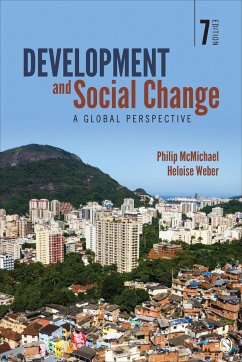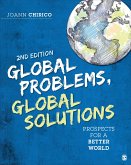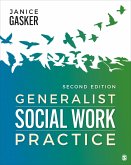94,99 €
inkl. MwSt.
**Unverbindliche Preisempfehlung des Herstellers
Versandkostenfrei*Versandfertig in 6-10 Tagen

47 °P sammeln
- Broschiertes Buch
- Merkliste
- Auf die Merkliste
- Bewerten Bewerten
- Teilen
- Produkt teilen
- Produkterinnerung
- Produkterinnerung
Development and Social Change: A Global Perspective explains how development thinking and practice have shaped our world. It introduces students to four interconnected projects, and how their dynamics, contradictions and controversies have influenced development trajectories: colonialism, the development era, the neoliberal globalization project, and sustainable development. Authors Philip McMichael and Heloise Weber use case studies and examples to help describe a complex world in transition. Students are encouraged to see global development as a contested historical project. By showing how…mehr
Andere Kunden interessierten sich auch für
![Global Problems, Global Solutions Global Problems, Global Solutions]() JoAnn A. ChiricoGlobal Problems, Global Solutions190,99 €
JoAnn A. ChiricoGlobal Problems, Global Solutions190,99 €![Social Work with Children, Young People and their Families in Scotland Social Work with Children, Young People and their Families in Scotland]() Steve HothersallSocial Work with Children, Young People and their Families in Scotland34,99 €
Steve HothersallSocial Work with Children, Young People and their Families in Scotland34,99 €![Social Work with Drug, Alcohol and Substance Misusers Social Work with Drug, Alcohol and Substance Misusers]() Anthony GoodmanSocial Work with Drug, Alcohol and Substance Misusers28,99 €
Anthony GoodmanSocial Work with Drug, Alcohol and Substance Misusers28,99 €![Mental Health and Mental Capacity Law for Social Workers Mental Health and Mental Capacity Law for Social Workers]() Simon GodefroyMental Health and Mental Capacity Law for Social Workers26,99 €
Simon GodefroyMental Health and Mental Capacity Law for Social Workers26,99 €![Generalist Social Work Practice Generalist Social Work Practice]() Janice A. GaskerGeneralist Social Work Practice191,99 €
Janice A. GaskerGeneralist Social Work Practice191,99 €![Doing Research in Sport and Exercise Doing Research in Sport and Exercise]() Mark SmithDoing Research in Sport and Exercise171,99 €
Mark SmithDoing Research in Sport and Exercise171,99 €![Doing Research in Sport and Exercise Doing Research in Sport and Exercise]() Mark SmithDoing Research in Sport and Exercise50,99 €
Mark SmithDoing Research in Sport and Exercise50,99 €-
-
-
Development and Social Change: A Global Perspective explains how development thinking and practice have shaped our world. It introduces students to four interconnected projects, and how their dynamics, contradictions and controversies have influenced development trajectories: colonialism, the development era, the neoliberal globalization project, and sustainable development. Authors Philip McMichael and Heloise Weber use case studies and examples to help describe a complex world in transition. Students are encouraged to see global development as a contested historical project. By showing how development stems from unequal power relationships between and among peoples and states, often with planet-threatening environmental outcomes, it enables readers to reflect on the possibilities for more just social, ecological and political relations.
Produktdetails
- Produktdetails
- Verlag: SAGE Publications, Inc / Sage Publications
- 7. Aufl.
- Seitenzahl: 464
- Erscheinungstermin: 25. Januar 2021
- Englisch
- Abmessung: 229mm x 154mm x 24mm
- Gewicht: 669g
- ISBN-13: 9781544305363
- ISBN-10: 1544305362
- Artikelnr.: 59642145
- Herstellerkennzeichnung
- Libri GmbH
- Europaallee 1
- 36244 Bad Hersfeld
- gpsr@libri.de
- Verlag: SAGE Publications, Inc / Sage Publications
- 7. Aufl.
- Seitenzahl: 464
- Erscheinungstermin: 25. Januar 2021
- Englisch
- Abmessung: 229mm x 154mm x 24mm
- Gewicht: 669g
- ISBN-13: 9781544305363
- ISBN-10: 1544305362
- Artikelnr.: 59642145
- Herstellerkennzeichnung
- Libri GmbH
- Europaallee 1
- 36244 Bad Hersfeld
- gpsr@libri.de
Philip McMichael grew up in Adelaide, South Australia, completing undergraduate degrees in economics and in political science at the University of Adelaide. After traveling in India, Pakistan, and Afghanistan and doing community work in Papua New Guinea, he pursued his doctorate in sociology at the State University of New York at Binghamton. He has taught at the University of New England (New South Wales), Swarthmore College, and the University of Georgia, and he is presently Emeritus Professor of Global Development at Cornell University, in Ithaca, NY. Other appointments include Visiting Senior Research Scholar in International Development at the University of Oxford (Wolfson College) and Visiting Scholar, School of Political Science and International Relations at the University of Queensland. His book Settlers and the Agrarian Question: Foundations of Capitalism in Colonial Australia (1984) won the Social Science History Association's Allan Sharlin Memorial Award in 1985. In addition to authoring Food Regimes and Agrarian Questions (2013), McMichael edited The Global Restructuring of Agro-Food Systems (1994), Food and Agrarian Orders in the World Economy (1995), New Directions in the Sociology of Global Development (2005) with Frederick H. Buttel, Contesting Development: Critical Struggles for Social Change (2010), The Politics of Biofuels, Land and Agrarian Change (2011) with Jun Borras and Ian Scoones, and Finance or Food? The Role of Cultures, Values and Ethics in Land Use Negotiations, with Hilde Bjørkhaug and Bruce Muirhead (2020). He has served twice as chair of his department, as director of Cornell University's International Political Economy Program, as chair of the American Sociological Association's Political Economy of the World-System Section, as president of the Research Committee on Agriculture and Food for the International Sociological Association. He is also an active member of the International Studies Association. He has also worked with the Food and Agriculture Organization of the United Nations (FAO) and the Civil Society Mechanism of the FAO's Committee on World Food Security (CFS), the UN Research Institute for Social Development (UNRISD), the international peasant coalition Via Campesina, and the International Planning Committee for Food Sovereignty.
About the Authors
Preface to the Seventh Edition
A Timeline of Development
Acknowledgments
Abbreviations
Chapter 1. Development
What Is the World Coming To?
Development: History and Politics
Development Theory
Social Change
PART I. THE DEVELOPMENT PROJECT (LATE 1940s TO EARLY 1970s)
Chapter 2. Instituting the Development Project: Colonialism, Anticolonial Struggles, and Decolonization
Colonialism
Decolonization
Decolonization and Development
Postwar Decolonization and the Rise of the Third World
Ingredients of the Development Project
Framing the Development Project
Economic Nationalism
Chapter 3. The Development Project: An International Framework in Global Context
The International Framework of National Development Projects
Remaking the International Division of Labor
The Food Aid Regime
Remaking Third World Agricultures
PART II. THE GLOBALIZATION PROJECT (1980s TO 2000s)
Chapter 4. Instituting the Globalization Project
The Debt Crisis and Structural Adjustment Programs: Organizing Neoliberal Development
The Globalization Project
Global Governance
The World Trade Organization
Chapter 5. The Globalization Project: Processes, Experiences, and Implications
Neoliberal Governance of Development and Poverty: IFIs and the WTO
Outsourcing and the (New) Global Division of Labor
Global Labor-Sourcing Politics and Migration
Displacement
Informalization
Neoliberal Development and Extractivism: Reconfiguring International Relations
Agricultural Globalization
Chapter 6. Global Countermovements
Environmentalism
Feminisms
New Sovereignty Struggles: Food Sovereignty
PART III MILLENNIAL RECKONINGS (2000s TO PRESENT)
Chapter 7. The Globalization Project in Crisis
Social Crisis
Legitimacy Crisis
Geopolitical Transitions
Neo-Illiberalism and the Changing of the Guard
Ecological Crisis
Chapter 8. Development Climate, or The Nature of Development
Life-Worlds at Odds
The Challenge of Climate Change
Business as Usual?
Sustainable Intensification Proposals
Sustainable Intensification at Work
Renewable Energy
Conclusion: Ecosystem Priority
Chapter 9. Public and Local Green Initiatives
Public Greening Initiatives
Urban Initiatives
Circular Economy
Transition Towns
The Commons
Rural Initiatives
Agroecology
Conclusion
Chapter 10. Toward Sustainable Development
Ingredients of Project Coherence
What Is Appropriate to These Times?
Sustainable Development Project Implementation
Retheorizing Economics
Green New Dealism
Development Multilateralism
Conclusion
Notes
References
Index
Preface to the Seventh Edition
A Timeline of Development
Acknowledgments
Abbreviations
Chapter 1. Development
What Is the World Coming To?
Development: History and Politics
Development Theory
Social Change
PART I. THE DEVELOPMENT PROJECT (LATE 1940s TO EARLY 1970s)
Chapter 2. Instituting the Development Project: Colonialism, Anticolonial Struggles, and Decolonization
Colonialism
Decolonization
Decolonization and Development
Postwar Decolonization and the Rise of the Third World
Ingredients of the Development Project
Framing the Development Project
Economic Nationalism
Chapter 3. The Development Project: An International Framework in Global Context
The International Framework of National Development Projects
Remaking the International Division of Labor
The Food Aid Regime
Remaking Third World Agricultures
PART II. THE GLOBALIZATION PROJECT (1980s TO 2000s)
Chapter 4. Instituting the Globalization Project
The Debt Crisis and Structural Adjustment Programs: Organizing Neoliberal Development
The Globalization Project
Global Governance
The World Trade Organization
Chapter 5. The Globalization Project: Processes, Experiences, and Implications
Neoliberal Governance of Development and Poverty: IFIs and the WTO
Outsourcing and the (New) Global Division of Labor
Global Labor-Sourcing Politics and Migration
Displacement
Informalization
Neoliberal Development and Extractivism: Reconfiguring International Relations
Agricultural Globalization
Chapter 6. Global Countermovements
Environmentalism
Feminisms
New Sovereignty Struggles: Food Sovereignty
PART III MILLENNIAL RECKONINGS (2000s TO PRESENT)
Chapter 7. The Globalization Project in Crisis
Social Crisis
Legitimacy Crisis
Geopolitical Transitions
Neo-Illiberalism and the Changing of the Guard
Ecological Crisis
Chapter 8. Development Climate, or The Nature of Development
Life-Worlds at Odds
The Challenge of Climate Change
Business as Usual?
Sustainable Intensification Proposals
Sustainable Intensification at Work
Renewable Energy
Conclusion: Ecosystem Priority
Chapter 9. Public and Local Green Initiatives
Public Greening Initiatives
Urban Initiatives
Circular Economy
Transition Towns
The Commons
Rural Initiatives
Agroecology
Conclusion
Chapter 10. Toward Sustainable Development
Ingredients of Project Coherence
What Is Appropriate to These Times?
Sustainable Development Project Implementation
Retheorizing Economics
Green New Dealism
Development Multilateralism
Conclusion
Notes
References
Index
About the Authors
Preface to the Seventh Edition
A Timeline of Development
Acknowledgments
Abbreviations
Chapter 1. Development
What Is the World Coming To?
Development: History and Politics
Development Theory
Social Change
PART I. THE DEVELOPMENT PROJECT (LATE 1940s TO EARLY 1970s)
Chapter 2. Instituting the Development Project: Colonialism, Anticolonial Struggles, and Decolonization
Colonialism
Decolonization
Decolonization and Development
Postwar Decolonization and the Rise of the Third World
Ingredients of the Development Project
Framing the Development Project
Economic Nationalism
Chapter 3. The Development Project: An International Framework in Global Context
The International Framework of National Development Projects
Remaking the International Division of Labor
The Food Aid Regime
Remaking Third World Agricultures
PART II. THE GLOBALIZATION PROJECT (1980s TO 2000s)
Chapter 4. Instituting the Globalization Project
The Debt Crisis and Structural Adjustment Programs: Organizing Neoliberal Development
The Globalization Project
Global Governance
The World Trade Organization
Chapter 5. The Globalization Project: Processes, Experiences, and Implications
Neoliberal Governance of Development and Poverty: IFIs and the WTO
Outsourcing and the (New) Global Division of Labor
Global Labor-Sourcing Politics and Migration
Displacement
Informalization
Neoliberal Development and Extractivism: Reconfiguring International Relations
Agricultural Globalization
Chapter 6. Global Countermovements
Environmentalism
Feminisms
New Sovereignty Struggles: Food Sovereignty
PART III MILLENNIAL RECKONINGS (2000s TO PRESENT)
Chapter 7. The Globalization Project in Crisis
Social Crisis
Legitimacy Crisis
Geopolitical Transitions
Neo-Illiberalism and the Changing of the Guard
Ecological Crisis
Chapter 8. Development Climate, or The Nature of Development
Life-Worlds at Odds
The Challenge of Climate Change
Business as Usual?
Sustainable Intensification Proposals
Sustainable Intensification at Work
Renewable Energy
Conclusion: Ecosystem Priority
Chapter 9. Public and Local Green Initiatives
Public Greening Initiatives
Urban Initiatives
Circular Economy
Transition Towns
The Commons
Rural Initiatives
Agroecology
Conclusion
Chapter 10. Toward Sustainable Development
Ingredients of Project Coherence
What Is Appropriate to These Times?
Sustainable Development Project Implementation
Retheorizing Economics
Green New Dealism
Development Multilateralism
Conclusion
Notes
References
Index
Preface to the Seventh Edition
A Timeline of Development
Acknowledgments
Abbreviations
Chapter 1. Development
What Is the World Coming To?
Development: History and Politics
Development Theory
Social Change
PART I. THE DEVELOPMENT PROJECT (LATE 1940s TO EARLY 1970s)
Chapter 2. Instituting the Development Project: Colonialism, Anticolonial Struggles, and Decolonization
Colonialism
Decolonization
Decolonization and Development
Postwar Decolonization and the Rise of the Third World
Ingredients of the Development Project
Framing the Development Project
Economic Nationalism
Chapter 3. The Development Project: An International Framework in Global Context
The International Framework of National Development Projects
Remaking the International Division of Labor
The Food Aid Regime
Remaking Third World Agricultures
PART II. THE GLOBALIZATION PROJECT (1980s TO 2000s)
Chapter 4. Instituting the Globalization Project
The Debt Crisis and Structural Adjustment Programs: Organizing Neoliberal Development
The Globalization Project
Global Governance
The World Trade Organization
Chapter 5. The Globalization Project: Processes, Experiences, and Implications
Neoliberal Governance of Development and Poverty: IFIs and the WTO
Outsourcing and the (New) Global Division of Labor
Global Labor-Sourcing Politics and Migration
Displacement
Informalization
Neoliberal Development and Extractivism: Reconfiguring International Relations
Agricultural Globalization
Chapter 6. Global Countermovements
Environmentalism
Feminisms
New Sovereignty Struggles: Food Sovereignty
PART III MILLENNIAL RECKONINGS (2000s TO PRESENT)
Chapter 7. The Globalization Project in Crisis
Social Crisis
Legitimacy Crisis
Geopolitical Transitions
Neo-Illiberalism and the Changing of the Guard
Ecological Crisis
Chapter 8. Development Climate, or The Nature of Development
Life-Worlds at Odds
The Challenge of Climate Change
Business as Usual?
Sustainable Intensification Proposals
Sustainable Intensification at Work
Renewable Energy
Conclusion: Ecosystem Priority
Chapter 9. Public and Local Green Initiatives
Public Greening Initiatives
Urban Initiatives
Circular Economy
Transition Towns
The Commons
Rural Initiatives
Agroecology
Conclusion
Chapter 10. Toward Sustainable Development
Ingredients of Project Coherence
What Is Appropriate to These Times?
Sustainable Development Project Implementation
Retheorizing Economics
Green New Dealism
Development Multilateralism
Conclusion
Notes
References
Index







